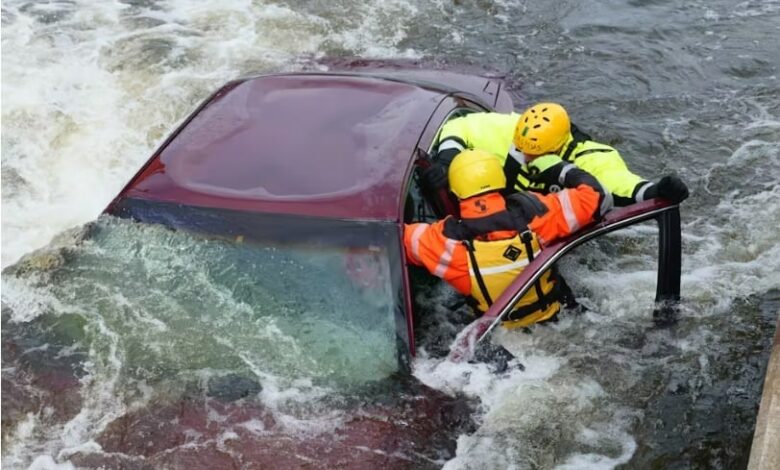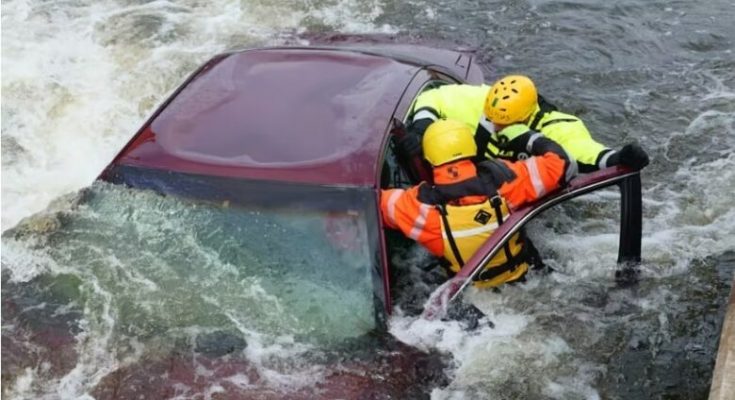Family found in car in river they were with their, See details

A tragic accident in Brazil has left an entire community grieving after a family of three lost their lives when their car veered off the road and plunged into a river. What makes the tragedy even more painful is that the family was traveling not for leisure or escape, but out of love and necessity—taking their young son to receive surgery that was meant to improve his health. What should have been a hopeful journey became an irreversible heartbreak.
The victims were identified as Hérida Nascimento da Silva, her husband Sebastião Cícero Gomes, and their three-year-old son, Miguel Nascimento Gomes. Residents of Várzea Alegre, a town in the state of Ceará, the family had left home early in the morning, heading to Juazeiro do Norte. Their goal was simple: to give Miguel a chance at better health through a scheduled medical procedure. Instead, fate intervened in the cruelest way.
According to local reports, including coverage from TV Verdes Mares and confirmation by the Ceará Military Fire Department, the accident occurred at approximately 7 a.m. near the rural community of Sítio Piripiri. The road was familiar to many, a stretch often taken by families traveling between small towns and larger cities for school, work, or medical appointments. On that morning, however, the family’s vehicle lost control, left the road, and plunged into a stream with waters nearly five meters deep.
First responders described the scene as harrowing. By the time emergency crews arrived, the car was already fully submerged, its roof invisible beneath the current. Divers and firefighters battled difficult terrain and murky water to reach the vehicle. Every second mattered, but the conditions made the rescue attempt painfully slow. When the car was finally recovered and opened, all three passengers were lifeless.
For their community, the shock was unbearable. Neighbors who had watched Hérida and Sebastião raise their little boy could hardly process the loss. In one moment, a family known for their warmth and resilience was gone. For many, the tragedy underscored the fragility of life—how an ordinary journey for something as essential as healthcare can turn into devastation.
The story quickly spread across Ceará and beyond, not only because of the heartbreaking loss of three lives, but because of the context. The family was not on a casual drive. They were on their way to care for their child. That detail has struck a deep chord with people across Brazil, amplifying grief into anger and frustration.
Road safety has long been a pressing issue in Brazil. While major cities benefit from modern infrastructure, many rural areas are still plagued with poorly maintained roads, minimal barriers, and limited signage. Fatal accidents are all too common, and when emergencies happen in remote areas, first responders often face serious delays reaching victims. This case highlighted those challenges once again. Had there been barriers along the road, some argue, the car might never have entered the water. Had access for rescuers been quicker, perhaps there might have been a chance to save them.
Statistics reveal the gravity of the issue: Brazil records tens of thousands of traffic-related deaths each year, many of them occurring in smaller municipalities. The combination of aging vehicles, long stretches of road without adequate safety infrastructure, and the lack of rapid emergency response makes rural families particularly vulnerable. For those already struggling, as this family was, these risks are part of everyday life.
Public officials and advocates are now calling for more investment in infrastructure, particularly in regions like Ceará. Proposals include installing roadside barriers near rivers and streams, increasing signage in accident-prone zones, and improving mapping systems so emergency services can respond faster. But beyond road safety, the tragedy also highlights another issue: the uneven access to healthcare.
Miguel’s parents were traveling because the care he needed was not available in their hometown. This is not unusual in Brazil, where families in rural areas often face long journeys for specialized medical treatment. For parents already under strain, such trips can feel daunting, but they make them anyway because their children’s health demands it. The heartbreaking irony in this case is that a trip meant to heal Miguel ended up costing all three their lives.
As the news spread, social media filled with tributes to the family. Friends and strangers alike posted messages of sorrow, solidarity, and prayers. Candlelight vigils were organized in both Várzea Alegre and Juazeiro do Norte. Parents, especially, found themselves shaken, imagining their own children in Miguel’s place. The story became not just about one family’s loss, but about a national reflection on safety, access, and the unpredictable cruelty of life.
For Hérida and Sebastião’s relatives, the grief is compounded by the abruptness of it all. There was no chance to say goodbye, no preparation for loss. In the space of one morning, they were robbed of a daughter, a son-in-law, and a grandson. Their home now sits quiet, filled with the echoes of a life interrupted.
Community members describe Hérida as a loving mother who always placed her child’s needs first. Sebastião was remembered as a hard-working father devoted to his family’s well-being. Miguel, at only three years old, was described as bright, curious, and full of laughter—a child whose life had barely begun. To lose all three together feels like a wound that may never close.
In the days since the accident, local leaders have vowed to push harder for road safety improvements. Civil organizations are urging policymakers to see this tragedy not as an isolated case, but as a symptom of a broader problem. Parents and doctors alike have also joined the call for more localized access to pediatric care, so families do not need to risk their lives on long journeys to receive essential treatment.
For now, though, the focus remains on mourning and remembrance. Funerals were attended by hundreds, with mourners filling the small town’s church to capacity. Outside, people gathered in silence, some holding flowers, others simply holding one another. It was a show of collective grief, a recognition that while the loss belonged most to the family, it touched everyone who had ever made a similar journey, ever prayed for a child’s recovery, or ever worried about the dangers of Brazil’s roads.
As the community grieves, the story of Hérida, Sebastião, and Miguel stands as both a tragedy and a lesson. It reminds us of the fragility of life, the importance of safety, and the urgent need to address preventable risks. But beyond policy and infrastructure, it is also a story of love—a family bound together, traveling in hope, united until the very end.
Their names will now be spoken with sorrow, but also with tenderness. Their story is a painful reminder that behind every statistic is a family with dreams, with futures, with a bond that cannot be measured. And though their lives were cut short, the memory of their love will endure in the hearts of those who knew them, and in the collective call for change their tragedy has inspired.



